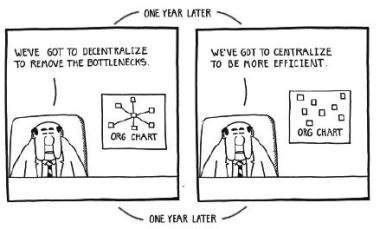“In the early 20th century, big companies were synonymous with efficiency. In the late 20th century they were synonymous with inefficiency.” writes Paul Graham in his post ‘Refragmentation‘.
 This is of course a bit simplified, however it fits with the historic trend of outsourcing and contracting a lot of the value chain out of the main industrial conglomerates into networks of suppliers and contractors, and the emergence of loose networks of small entities that prove to be more flexible and resilient than large organizations.
This is of course a bit simplified, however it fits with the historic trend of outsourcing and contracting a lot of the value chain out of the main industrial conglomerates into networks of suppliers and contractors, and the emergence of loose networks of small entities that prove to be more flexible and resilient than large organizations.
At the same time to be successful in large endeavors and projects, large organizations are still needed to leverage the appropriate financing and create the local conditions of low complexity and alignment that are necessary to make these endeavors successful.
It is difficult to combine the flexibility of networks of small, relatively independent entities with the coherence and leverage that are necessary for large endeavors. There is no fixed recipe, however that is probably quite the form of organization that will be the future in the Collaborative Age. We need to find the right approaches, and that is certainly one the challenges I encounter on a regular basis in my consulting activities.
